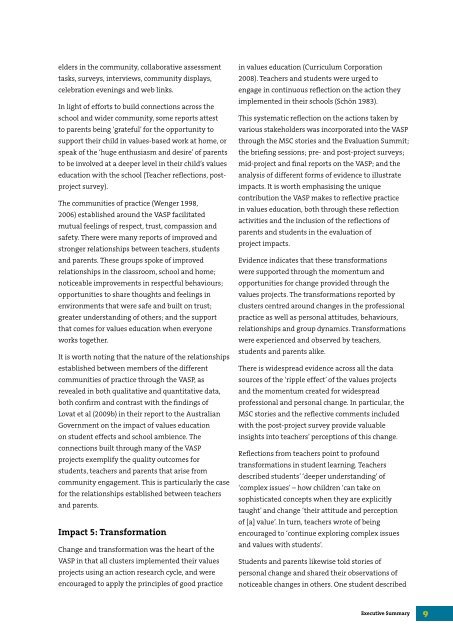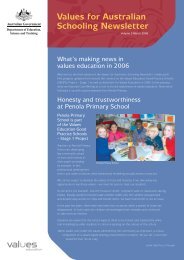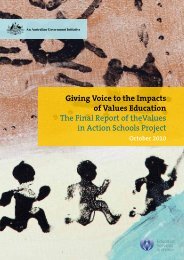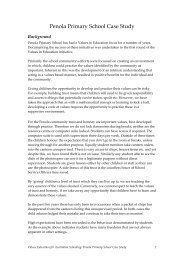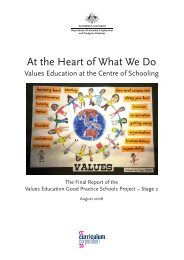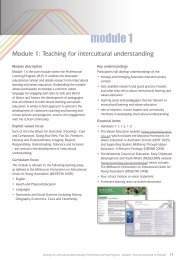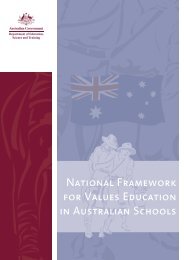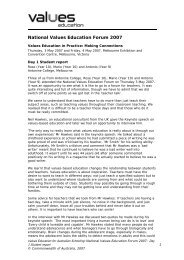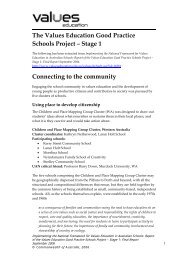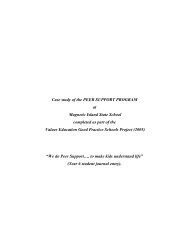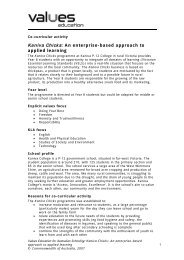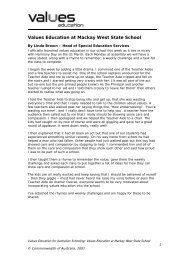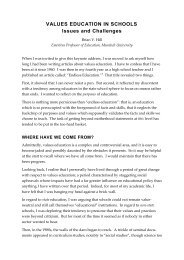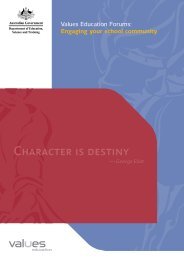Giving Voice to the Impacts of Values Education The Final Report of ...
Giving Voice to the Impacts of Values Education The Final Report of ...
Giving Voice to the Impacts of Values Education The Final Report of ...
Create successful ePaper yourself
Turn your PDF publications into a flip-book with our unique Google optimized e-Paper software.
elders in <strong>the</strong> community, collaborative assessment<br />
tasks, surveys, interviews, community displays,<br />
celebration evenings and web links.<br />
In light <strong>of</strong> efforts <strong>to</strong> build connections across <strong>the</strong><br />
school and wider community, some reports attest<br />
<strong>to</strong> parents being ‘grateful’ for <strong>the</strong> opportunity <strong>to</strong><br />
support <strong>the</strong>ir child in values-based work at home, or<br />
speak <strong>of</strong> <strong>the</strong> ‘huge enthusiasm and desire’ <strong>of</strong> parents<br />
<strong>to</strong> be involved at a deeper level in <strong>the</strong>ir child’s values<br />
education with <strong>the</strong> school (Teacher reflections, postproject<br />
survey).<br />
<strong>The</strong> communities <strong>of</strong> practice (Wenger 1998,<br />
2006) established around <strong>the</strong> VASP facilitated<br />
mutual feelings <strong>of</strong> respect, trust, compassion and<br />
safety. <strong>The</strong>re were many reports <strong>of</strong> improved and<br />
stronger relationships between teachers, students<br />
and parents. <strong>The</strong>se groups spoke <strong>of</strong> improved<br />
relationships in <strong>the</strong> classroom, school and home;<br />
noticeable improvements in respectful behaviours;<br />
opportunities <strong>to</strong> share thoughts and feelings in<br />
environments that were safe and built on trust;<br />
greater understanding <strong>of</strong> o<strong>the</strong>rs; and <strong>the</strong> support<br />
that comes for values education when everyone<br />
works <strong>to</strong>ge<strong>the</strong>r.<br />
It is worth noting that <strong>the</strong> nature <strong>of</strong> <strong>the</strong> relationships<br />
established between members <strong>of</strong> <strong>the</strong> different<br />
communities <strong>of</strong> practice through <strong>the</strong> VASP, as<br />
revealed in both qualitative and quantitative data,<br />
both confirm and contrast with <strong>the</strong> findings <strong>of</strong><br />
Lovat et al (2009b) in <strong>the</strong>ir report <strong>to</strong> <strong>the</strong> Australian<br />
Government on <strong>the</strong> impact <strong>of</strong> values education<br />
on student effects and school ambience. <strong>The</strong><br />
connections built through many <strong>of</strong> <strong>the</strong> VASP<br />
projects exemplify <strong>the</strong> quality outcomes for<br />
students, teachers and parents that arise from<br />
community engagement. This is particularly <strong>the</strong> case<br />
for <strong>the</strong> relationships established between teachers<br />
and parents.<br />
Impact 5: Transformation<br />
Change and transformation was <strong>the</strong> heart <strong>of</strong> <strong>the</strong><br />
VASP in that all clusters implemented <strong>the</strong>ir values<br />
projects using an action research cycle, and were<br />
encouraged <strong>to</strong> apply <strong>the</strong> principles <strong>of</strong> good practice<br />
in values education (Curriculum Corporation<br />
2008). Teachers and students were urged <strong>to</strong><br />
engage in continuous reflection on <strong>the</strong> action <strong>the</strong>y<br />
implemented in <strong>the</strong>ir schools (Schön 1983).<br />
This systematic reflection on <strong>the</strong> actions taken by<br />
various stakeholders was incorporated in<strong>to</strong> <strong>the</strong> VASP<br />
through <strong>the</strong> MSC s<strong>to</strong>ries and <strong>the</strong> Evaluation Summit;<br />
<strong>the</strong> briefing sessions; pre- and post-project surveys;<br />
mid-project and final reports on <strong>the</strong> VASP; and <strong>the</strong><br />
analysis <strong>of</strong> different forms <strong>of</strong> evidence <strong>to</strong> illustrate<br />
impacts. It is worth emphasising <strong>the</strong> unique<br />
contribution <strong>the</strong> VASP makes <strong>to</strong> reflective practice<br />
in values education, both through <strong>the</strong>se reflection<br />
activities and <strong>the</strong> inclusion <strong>of</strong> <strong>the</strong> reflections <strong>of</strong><br />
parents and students in <strong>the</strong> evaluation <strong>of</strong><br />
project impacts.<br />
Evidence indicates that <strong>the</strong>se transformations<br />
were supported through <strong>the</strong> momentum and<br />
opportunities for change provided through <strong>the</strong><br />
values projects. <strong>The</strong> transformations reported by<br />
clusters centred around changes in <strong>the</strong> pr<strong>of</strong>essional<br />
practice as well as personal attitudes, behaviours,<br />
relationships and group dynamics. Transformations<br />
were experienced and observed by teachers,<br />
students and parents alike.<br />
<strong>The</strong>re is widespread evidence across all <strong>the</strong> data<br />
sources <strong>of</strong> <strong>the</strong> ‘ripple effect’ <strong>of</strong> <strong>the</strong> values projects<br />
and <strong>the</strong> momentum created for widespread<br />
pr<strong>of</strong>essional and personal change. In particular, <strong>the</strong><br />
MSC s<strong>to</strong>ries and <strong>the</strong> reflective comments included<br />
with <strong>the</strong> post-project survey provide valuable<br />
insights in<strong>to</strong> teachers’ perceptions <strong>of</strong> this change.<br />
Reflections from teachers point <strong>to</strong> pr<strong>of</strong>ound<br />
transformations in student learning. Teachers<br />
described students’ ‘deeper understanding’ <strong>of</strong><br />
‘complex issues’ – how children ‘can take on<br />
sophisticated concepts when <strong>the</strong>y are explicitly<br />
taught’ and change ‘<strong>the</strong>ir attitude and perception<br />
<strong>of</strong> [a] value’. In turn, teachers wrote <strong>of</strong> being<br />
encouraged <strong>to</strong> ‘continue exploring complex issues<br />
and values with students’.<br />
Students and parents likewise <strong>to</strong>ld s<strong>to</strong>ries <strong>of</strong><br />
personal change and shared <strong>the</strong>ir observations <strong>of</strong><br />
noticeable changes in o<strong>the</strong>rs. One student described<br />
Executive Summary<br />
9


